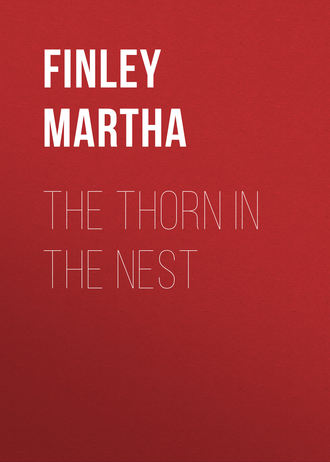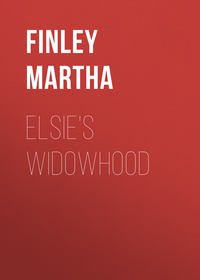 полная версия
полная версияThe Thorn in the Nest
"A pretty good haul considering."
"Yes; and now we'd best be off."
Suspicious words enough, but Kenneth had no time to think of them then, nor for hours afterward – so critical was the condition of his patient. It was only when on returning about sunrise the next morning, they were recalled to his mind by the sound of Mrs. Barbour's voice lifted up in scolding and lamentation.
"Yes, they're gone, every one of them; – that overcoat, just as good as new, the shirt I finished only the day before I started from home, and that elegant bandanna handkerchief. I told you somebody would get in and rob us in our sleep, if you didn't fasten the door well. Perhaps you'll believe another time that my opinion's worth something."
"There, there, Nancy, don't go on as if everything we had was lost. The town isn't so large that a thief can keep himself hid very long in it," Mr. Barbour was replying as the doctor stepped up to the open door.
"Good morning," he said, "I accidentally overheard Mrs. Barbour's lament, in passing, and I think I can throw some light on this matter," then went on to tell of what he had seen and heard the previous evening.
"So you see, Nancy, we weren't robbed in our sleep after all," was Mr. Barbour's comment, addressed to his wife.
"No thanks to you, anyhow," she retorted; "and it's your fault all the same; because I wouldn't have gone out and left the house alone if I'd had my way."
Mr. Barbour subsided. Why could he not learn how utterly useless it was to attempt to justify himself under the accusations of his wife?
"And there you sit never moving hand or foot to find the thief and get your own out of his clutches!" she whined, moving about with disconsolate and martyrlike air at her work of preparing the morning meal.
"Well, well, I'll go and see what can be done," he said, rising and putting on his hat. "Doctor, would you recognize the thief?"
"I am quite sure I should know again the suspicious looking persons I have been telling you of," Kenneth answered as they stepped out together.
"Now don't be gone all day, Mr. Barbour; breakfast will be on the table in half an hour," his wife called after him.
"Very well," he said looking back, "am I to let the thief escape rather than keep you waiting for an hour?"
"Of course you'll do one or the other – probably both," she fretted, as he walked on without waiting for an answer, "though it needn't take half that time to scour this wretched little town from end to end."
It did not; scarcely ten minutes had elapsed before it was known by every inhabitant that a theft had been committed, and that a man named Brannon and his wife, people of low character, whose absence would be gain to the place, had absconded during the night. They were not desirable citizens, but the stolen property must be recovered, and the larceny punished.
A hot pursuit was immediately begun, and before noon the culprits were taken and brought back in triumph.
But as yet the town had no constituted authorities. What was to be done?
The citizens gathered together on the river bank, chose one of their number, a Mr. Samuel Smith, as judge, and proceeded to try Brannon in due form; a jury was empanelled, the judge appointed Godfrey Dale as attorney for the prosecution, and another young lawyer, Maurice Gerard by name, for the defence.
Witnesses were called and examined. The goods had been found in possession of the accused, but he stoutly affirmed that they were his own.
Barbour, however, was able to prove property, and Dr. Clendenin's evidence was strong against the prisoner, whom he identified without hesitation as the man he had seen carrying away a bundle from Barbour's cabin the previous evening.
There was other testimony, but Kenneth's was the most conclusive.
The judge summed up the evidence, the jury retired to a short distance, and in a few moments returned with the verdict of guilty, and that the culprit be sentenced according to the discretion of the judge.
The latter presently announced his decision: – ten lashes upon the naked back of the prisoner, or that he should sit upon a bare pack-saddle on his pony, while his wife taking it by the bridle should lead it through every street of the village, pausing before the door of each house with the announcement, "This is Brannon who stole the great-coat, handkerchief, and shirt."
Brannon chose the latter horn of the dilemma, and a responsible person was appointed by the judge to see the sentence immediately and faithfully executed.
The crowd waited to see the man mounted upon the pony, then scattered to their homes or other positions favorable for watching his progress through the town.
He submitted to his punishment in dogged silence: glancing about him with an air of sullen defiance as he took his seat. Then his eye caught that of Kenneth fixed upon him in grave pity, and the look was returned with one of bitter hatred and revenge.
"Curse you!" he muttered under his breath, "the day will come when you'll repent of this."
CHAPTER V
The Brannons fled immediately upon being released, after the carrying out of the sentence. No one mourned their departure: but Nell Lamar, having heard from Dale of the look the culprit had cast upon Kenneth, rejoiced not a little in secret that they were gone.
"Dr. Clendenin had been so kind to her on her journey," she explained to herself, "that in common gratitude she must care for his safety."
Naturally, being both friend and physician to the major's family, Kenneth was a frequent visitor at their house. Though noticeably quiet and undemonstrative in manner, he soon became a great favorite with them all, from the parents down to the youngest child; and Nell saw no reason to appropriate his visits to herself, even when unprofessional.
Nor had she any desire to do so; and in fact his conversation was seldom directed to her. Yet it did not escape Clare's quick observation that the calm gray eye saw every movement of her young sister, and that no tone of the sweet girlish voice ever fell unheeded upon his ear.
She was well pleased, Nell could not help loving such a man, or being happy with him, so would soon be provided for, and the major relieved of her support.
That last would never have been the major's thought, his darling little sister was esteemed no burden by him. He was one of the wealthiest men in the place, held a highly responsible office under the general government, and had received large grants of land in compensation for his services in the Revolutionary war.
Nell was fond of her brother, yet stood somewhat in awe of him. He was a reserved, rather taciturn man, and military life had increased a natural tendency to sternness of manner toward those under his authority which belied his real kindness of heart. He had never a harsh word or look for Nell, yet she dared not lavish upon him the demonstrations of affection her loving young heart longed to bestow; dared not offer him a caress; and he rarely gave them unasked to her or to any one else except the youngest of his children.
Clare was more demonstrative and really meant to be very kind, but was as dictatorial and domineering in her way as the major in his, and before many days had passed she began to treat the young girl as a child, checking, criticising, reproving, and directing with the most exasperating persistency, and as having an undoubted right.
This was very trying to Nell's sense of womanly dignity; and though by no means an ill-tempered little body, she sometimes found it difficult to possess her soul in patience.
"Where now?" asked Clare one morning, addressing her.
"To the woods with the children, after wild flowers and mosses," returned the young girl gaily.
She was standing in the doorway swinging a broad-brimmed hat by its strings, her beautiful uncovered hair glittering like burnished gold in the sunbeams sifting down upon it through the leaves of the overshadowing trees, as they stirred restlessly to and fro in the pleasant summer breeze.
She was in a happy mood, light-hearted and free from care as the birds warbling overhead, and had been humming snatches of song till interrupted by Clare's question.
"You have been here nearly a week now," pursued that lady in precisely the tone she would have used to one of her children, "don't you think it is time to begin to make yourself useful? Life was never meant for a perpetual holiday."
Nell's cheek crimsoned.
"What would you have me do? offer my services as assistant to Silvy the cook, Maria the nurse-maid, or Tig the stable boy?" she asked in a slightly sarcastic tone.
"Silvy is an excellent cook, and it might not be at all amiss for you to take some lessons of her," said Clare. "But there are other employments. The children need instruction, and you ought to be able to give it. Then there are spinning and sewing."
"I don't know anything about spinning."
"I'll teach you, in return for the lessons you give the children in spelling, reading and writing."
"Very well, we'll talk of it when I come back from my walk," Nell answered, tying on her hat.
She was willing enough to make herself useful, but Clare's manner was irritating.
Her annoyance was, however, soon forgotten in the prattle of the children, and the beauty of the woods.
They wandered about till weary, then sat down on a log to rest.
"Now if I only had a book," remarked Nell.
"Why didn't you bring one?" asked Bess.
"I don't mean a Sunday book, such as those on the shelves in the sitting-room," was the half scornful reply.
"Aunt Nell, there are some other kinds of books up in the garret."
"What kinds?"
"Oh, I don't know; stories, I believe, but not fit for me to read, mother says."
Nell rose eagerly. "Come, let us go back," she said, "I must see those books. But how came they there?"
Bess explained as they wended their homeward way, she walking soberly by her aunt's side, the boys racing on before, climbing and jumping over stumps and logs.
The major had formerly been in the mercantile business, and in the garret were stowed away boxes of goods – a medley of many odds and ends which had fallen to his share in the division of unsold stock made by himself and partner in the winding up of the joint concern.
The garret was the favorite resort of the children when kept within doors by stormy weather, and Bess had made herself well acquainted with the contents of the boxes, turning them over and over in search of "pretty things" with which to bedeck her dolls and herself.
The books proved to be novels – "Claremont" complete in several volumes and an odd volume of "Peregrine Pickle."
Nell seized upon them with delight and carried them off to her bed-room. Books were rare luxuries in those days, there were no newspapers or magazines published in that region of country, and as yet there was no regular mail.
Nell read and re-read "Claremont," devoting to its perusal every spare moment when she could steal away unobserved to the solitude of her room, and carrying a volume with her in her rambles with the children.
Then she took up "Peregrine Pickle," but with sore disappointment that the first volume was missing; so much so that she at length plucked up courage to ask her brother what had become of it; though quite fearful that he would disapprove of her reading it.
"Well," he said with a smile, "I suppose my former partner has it, and somebody is probably as anxious for this as you are for it. I'm sorry, for your sake, that we were so careless in dividing our stock."
"It is just as well," said Clare; "time can be more profitably employed than in the reading of such trash."
"I consider it a very innocent amusement," replied the major, shortly; not over-pleased with the remark, seeing that it called a flush of wounded feeling to Nellie's fair cheek. "I remember that I enjoyed reading it myself. If it were in my power to get it for you, Nell, you should have it."
She thanked him with a look, then rose and left the room.
"This is but a dull place for her after Philadelphia," he said to his wife. "I have no doubt she misses the weekly newspaper and many another source of entertainment which she enjoyed there, but must do without here."
"Probably; but she is no worse off in regard to those things than any of the rest of us," said Clare coolly.
"You forget, my dear, that you have me," returned the major with playful pleasantry. "And the children," he added, taking his youngest on his knee. "We're worth a good deal, aren't we, Ralph?"
The major so sincerely regretted his sister's disappointment that it was frequently in his thoughts during the next week, and he was seriously considering the feasibility of sending to Philadelphia or New York for a box of books such as she would find both entertaining and instructive, when the want was supplied in an unlooked for manner.
Dr. Clendenin and his friend Dale had pushed forward their office building as fast as possible and taken possession.
Making a call upon Kenneth one afternoon, the major found him unpacking books and arranging them upon shelves he had had put up along the wall.
"Books!" cried the major. "You have quite a library. All medical works?"
"Oh, no," said Kenneth. "Will you step up and look at them? My stock is not large, but valuable, to me at least, and I hope to add to it from time to time."
"Valuable! yes, indeed, to a lover of literature," remarked the major running his eye over the titles. "Shakespeare, Milton, Pope, Dryden, Gray, Goldsmith, Gibbon, Plutarch, Rollins, etc., etc. Poetry, history, fiction are well represented, and I see you have a goodly supply of religious works of the best class, also. Medical books, too, in plenty, but of their quality I am no judge."
"Yes, I shall not want for good companionship here in my somewhat rough bachelor quarters," Kenneth answered, surveying his treasures with an air of quiet content. "But I do not mean to be selfish, major, make yourself at home among my friends."
"Thank you," returned the major heartily, wishing that Nell had been included in the invitation; when Kenneth, as if in answer to his thoughts, said, "The ladies of your family, too, might find something here to enjoy."
Then the major told of Nell's disappointment, and half an hour later was on his way home, carrying her the "Vicar of Wakefield," and the assurance that Dr. Clendenin's entire library was at her service.
Nell's face sparkled with delight at the news, and the sight of the book.
"How kind in him!" she said. "I'll handle them with the greatest care."
For many months those books and the talks with their owner which naturally grew out of their perusal, were her greatest enjoyment; for as yet she had very few companions near her own age.
But as the town grew there was a corresponding increase in its young society and in the sources of amusement and entertainment open to her. She had many admirers and Kenneth stepped quietly aside, as one who had no desire to win the prize.
Mrs. Lamar did not understand it, no more did Dale, or Nell herself, though Kenneth had never comported himself as a lover and she had not consciously thought of him.
There were other things about Kenneth that puzzled Dale. He seemed to have some secret grief; there were times when his look and manner betokened inexpressible sadness, though he always shook it off and assumed an air of cheerfulness on being spoken to.
Dale's curiosity was piqued, and indeed he would have rejoiced to give all the sympathy and comfort that might be in his power; but there was a quiet, reserved dignity about Kenneth that forbade any intrusion into his private affairs.
He rarely spoke of himself or his own concerns; he sometimes mentioned his mother or sister, always with the greatest respect and affection, but his talk when they were alone together was of literature, of the interests of the community in which they lived, the state, the country, the acts of the government, and what was going on in foreign lands, or of Dale's own plans and prospects, in which Kenneth took the most generous, unselfish interest.
As a physician he was untiring in his efforts to relieve, patient and sympathizing, in manner gentle even to tenderness with the aged and with the little ones.
He soon came to have great influence in the community and it was always cast on the side of right. A man of pure morals and an earnest Christian, he was as ready and competent to pray with the sick and dying, and to point out to the troubled soul the paths of peace, as any minister could be.
These offices were performed as simply and easily as those others in which the healing of the body only was concerned.
Another thing Dale noticed, with the thought that it was decidedly odd, that Kenneth took evident pains to make acquaintance with all the Indians in the vicinity, and of every white man who had visited their tribes, whether near or far off, or had had much to do with them in any way: that he asked many questions, wording each with care to avoid arousing suspicion in regard to his motives, and that invariably his main object seemed to be to gain information in regard to whites living among the Indians.
Once Dale ventured to ask if he had ever had a friend or relative carried off by them; but the answer was a quiet "No," that while it left his curiosity entirely unsatisfied, gave no encouragement to further questioning.
They were in Dale's office; Kenneth had come across the connecting hall with some enquiry in regard to a piece of land for the disposal of which Dale was the agent, and a casual mention of the Indians had made a favorable opening for his query.
A moment's silence followed Kenneth's reply, then Zeb came rushing in.
"Somefin goin' on down to de rivah, sahs, Squire Smith goin' for to hol' court, dey say. Sent de constable to cotch the tief an' fotch him along double quick."
Dale sprang from his chair and caught up his hat.
"My services may be needed," he said, laughing, "though the squire doesn't make much account of law. Come on, doc; if the sentence should be flogging you may be needed too."
A man named Adam McMurdy, who cultivated some land on the station prairie below the town, had come in to Squire Smith with a complaint that during his absence the previous night, some one had stolen his horse collar; that he had examined the collars on the horses of the ploughmen at work this morning, recognized one of them as his, and claimed it of the horse's owner, Bill Slack.
That Slack had not only refused to restore it, insisting that it was his own, but used very abusive language toward him (McMurdy), and threatened to whip him for accusing him of the theft.
On hearing the story the squire immediately despatched his constable in search of Slack, with strict orders to bring him and the collar at once into court.
The court had already convened under the trees by the river side, and the constable was hurrying toward it with the collar in one hand, the accused tightly grasped in the other, as Dr. Clendenin and Dale stepped into the street.
They followed quickly on the heels of the constable. Life had so little of the spice of variety then and there that even so trivial an affair created some stir and excitement.
Also the squire had an amusing method of dealing out justice that made a trial conducted by him somewhat entertaining to those who were spectators.
Nearly all the men of the town were there.
The prisoner being arraigned at the bar of justice, the squire turned to McMurdy and asked, "How can you prove this collar to be yours?"
"If the collar is mine," he replied, "Mr. Spear, who is present, can testify."
Mr. Spear, the Presbyterian minister, stepped forward.
"If the collar is McMurdy's," he said, "I wrote his name on it, on the inner side of the ear."
"Hand it to me," said the squire. Taking it from the constable and turning up the ear, "Yes, here's the name. No better proof could be given, and my sentence is – "
"If the court will excuse the interruption," began Dale, a mischievous twinkle in his eye; "let me say that according to law, as – "
"No, the court won't be interrupted," returned the squire, frowning him down. "All laws were intended for the purpose of enforcing justice. I know what's right and what's wrong as well as the man that made the laws; therefore stand in no need of laws to govern my actions.
"My sentence is that the prisoner be tied up forthwith to your buckeye and receive five lashes well laid on."
It was done and the crowd dispersed. The trial had occupied scarcely five minutes and every one was satisfied except the culprit.
CHAPTER VI
"There's even-handed justice for ye, stranger?"
A stalwart backwoodsman in hunting garb of dressed skins was the speaker, and the words were addressed to Kenneth, near to whom he had stood during the brief trial of Bill Slack.
Dale had walked away in company with a brother lawyer, and Kenneth was turning from the unpleasant scene with a thought of pity for the weakness and wickedness of the unhappy criminal.
"Yes," he answered, "Squire Smith is a man of discriminating mind and judgment, very impartial in his decisions, and prompt in seeing them carried out. But what a happy world this might be if all were honest and upright!"
"That's true; but we've got to take it as it is.
"Got quite a town here," pursued the hunter, moving along by Kenneth's side as he walked up the street. "Last time I was round here in these parts, there wasn't so much as an Injun wigwam to be seen; nothin' but the thickest kind o' thick woods."
"I thought your face was quite new to me," said Kenneth. "May I ask where you are from?"
"You kin ask, sir, and I haven't the least objection in life to tellin'. I've been huntin' and trappin' all through this Northwestern Territory, along the Ohio and the Little Miami, and away up north by the great lakes; and even as far as the head waters of the Mississippi. And I come back with a lot of furs and skins. Sold 'em mostly in Detroit."
"Ah!" exclaimed Kenneth, with interest. "You must have had an adventurous life, and fallen in with many tribes of Indians."
"Humph! yes, young man; saw a good deal more of the ugly, treacherous varmints than I cared to. I hain't no love for 'em, and no more have they for me."
"You have had some encounters with them?"
"More'n a few, stranger. I've taken their scalps, and been mighty near losin' my own; have been in their clutches several times, run the gauntlet twice, and would have been burnt at the stake if I hadn't made my escape. However, I haven't any more to tell than any other man that's been huntin' and trappin' for ten or a dozen years."
Kenneth invited him into his office, set food and drink before him, and by dint of adroit questioning drew from him a good deal of information in regard to the various tribes among whom he had been.
"Have you ever met with any whites living with them?" he asked at length.
"Yes, occasionally. There's Simon Gerty; I saw him, and he's a worse savage than the redskins."
"But any others? Any women?"
"I met another man that was a prisoner, got away afterwards; and saw children at different times, girls and boys, both, that they'd stole away from their folks and adopted. And I saw a white woman a few weeks ago, that's been with 'em for years, and is married to an Injun; got a family of pappooses."
In reply to further questions he went on to describe the situation of the Indian village where he had seen this woman, but could give no description of her, except that she was very much tanned, dressed like the squaws, and had scarcely a more civilized look than they.
"I hope she's no kin o' yours?" he remarked, looking keenly at his questioner.
"No; I never had friend or relative taken by them," Kenneth answered, "though our family were pioneers, and several of them lost their lives by the Indians."
"Humph! then I reckon you hain't no love for 'em either?"
"Not so much as I ought to have, I'm afraid."
"How's that? Can't say as I see any call to love 'em at all."
"They are human creatures, and Christ died for them as well as for the white man. Doubtless they are equally dear to Him," Kenneth answered, with gentle gravity, fixing a kindly look upon his rough companion.









